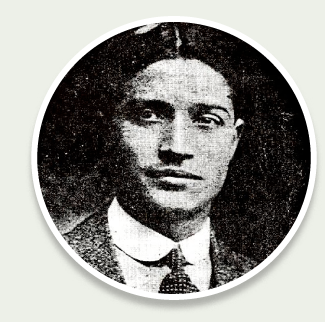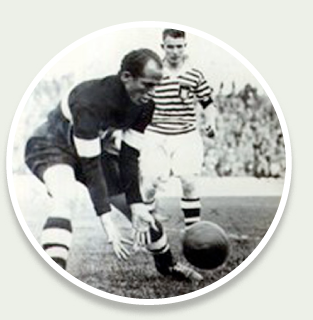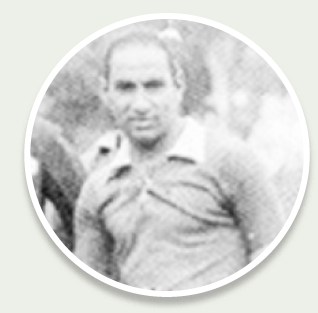LONDON: The World Cup is underway, and the hopes of football-mad Arab nations are rising. Many eyes are on Mohamed Salah, star of the Egyptian team and of the English Premier League, to elevate the reputation of Arab footballers.
At Liverpool, the 25-year-old is adored. But he is not the first Egyptian that British football fans have taken to their hearts.
Long, long before Mo, there was Mustafa Mansour and Mohamed Latif in the 1930s and before them, there was Hussein Hegazi and Tewfik Abdullah. All were Egyptians footballers who brought their dazzling skills to British clubs.
One was a striker who had poems written about him; one graced the cover of the top football magazine of the time; one was a goalkeeper regarded as a trailblazer for African football who later served as a government minister, and one played for Glasgow Rangers and went on to become his country’s top football commentator.
Hussein Hegazi
Hegazi was the first. Born into a wealthy aristocratic Cairo family in 1891, he honed his footballing skills by playing against British soldiers and by the time he arrived in England in 1911 to study engineering at University College, London, he was already known in Egypt as a prolific goal scorer, notching up 57 in one season. He was also a top-class runner, winning the national championships in the quarter-mile and half-mile (equivalent to today’s 400 meters and 800 meters) four years in a row. 
How he came to the attention of Dulwich Hamlet FC, a well-established non-league club in South London is unclear but he made his debut with them on Sept. 23, 1911, to great acclaim. With his wiry build (he weighed only 60 kg), he was described as having “a lightning drive.”
A match report in the local newspaper, the “South London Press,” said: “The Egyptian gave a splendid exhibition… simply conjured with the ball.” Another report from Oct. 13 called him “the thinking man’s footballer.”
The fans loved him as much as the pundits and promptly nicknamed him Nebuchadnezzar.
It was not long before a much bigger club noticed him. Fulham, then in the Second Division (today’s Championship), were eager to sign him up, especially after Hegazi scored in his try-out for them against Stockport County on Nov. 11.
Alarmed at the prospect of losing him, Dulwich Hamlet manager Pa Wilson turned up at Hegazi’s lodgings. After listening to Wilson’s pleadings, Hegazi felt honor-bound to stay at Dulwich.
“I was in a difficulty for I wanted to play very much in league football and at the same time I did not want to leave Dulwich Hamlet, who have been very good to me,” he said. Wilson called Hegazi “as honorable a man as ever stepped on to a football field” and a writer for the “Athletic News” was moved to write a five-verse poem in tribute.
Hegazi did two European tours with Dulwich Hamlet and also played for the London county team. In 1913, he embarked on studies at Cambridge University but left before the end of his first year, though not before winning a Blue with the university football team. He played for the national Egyptian team in the 1920 and 1924 Olympics and finally hung up his boots in 1932, aged 40. He died in 1958. A street in the Garden City area of Cairo is named after him.
Tewfik Abdullah
Tewfik Abdullah (sometimes spelled Tawfik Abdallah), the second Egyptian to play in Britain, was encouraged by his friendship with Tommy Barbour, a Scottish soldier in the British army serving in Egypt who also played fullback for Derby County.
Born in Cairo in June 1896, Abdullah, a midfielder, began his career with Cairo club, El-Mokhtalat, and played for the national team at the 1920 Olympics. He also played against the British army, where he met Barbour.
Abdullah made his English league debut in October 1920 against Manchester City and was instantly nicknamed “Toothpick.”
One possibly apocryphal tale about his first game relates that he came out on to the pitch asking, “Where’s me camel?” It transpired he was, in fact, asking, “Where’s Mick Hamill?” the City player he had been assigned to mark.
Abdullah scored in the match, which Derby won 3-0. The following month, he was on the cover of the magazine “Topical Times,” with the pyramids and the Sphinx in the background, as part of a feature on the fashion for recruiting players “from far afield.”
In 15 appearances for Derby County, Abdullah never scored again and in 1922 he joined Scottish Second Division side, Cowdenbeath, where he was nicknamed “Abe” and was awarded the ultimate accolade when a local leading miner named one of his racing greyhounds Abe in his honor.
Beset by injury, Abdullah only stayed one season in Scotland. In 1923, he joined Welsh non-league Bridgend Town and a year later he was back in the league with Hartlepool, in the northeast of England. He made 11 appearances, scored once and at the end of the 1924 season crossed the Atlantic to join the exotically named Providence Clamdiggers.
He played for four more teams in the US and went on to coach, but America’s racial segregation laws — which meant he was often not allowed to stay in the same hotels as his white colleagues — dismayed him. He returned to Egypt in the late 1920s for a year but crossed the Atlantic again to join Canadian side Montreal Carsteel, spending the rest of his playing career there.
After retiring he managed Farouk Club (an old name for Zamalek) and in 1940 became manager of the Egyptian national team, taking them to the 1952 Olympics in Helsinki, Finland.
More than a decade passed before an Egyptian again donned football boots for a British side — and then came a pair of them.
Goalkeeper Mustafa Kamel Mansour and winger Mohammad Latif were in Egypt’s 1934 World Cup squad, which was coached by Scotsman James McCrea.
Mustafa Kamel Mansour
Mansour, born in Alexandria in August 1914, began his club career with Al-Ahly. Latif, five years older, played for El-Mokhtalat, (another of Zamalek’s past names). Encouraged by their mentor, McCrae, they arrived in Scotland in 1935 and enrolled at Jordanhill College to train as physical education teachers.
 The Glasgow Rangers wanted them both but Mansour instead chose to join Queen’s Park, Scotland’s oldest club and also the only amateur team in the Scottish professional league. He even turned down the huge sum of £5,000 — equivalent to around £340,000 ($455,000 or SR1.7million) today — to turn professional.
The Glasgow Rangers wanted them both but Mansour instead chose to join Queen’s Park, Scotland’s oldest club and also the only amateur team in the Scottish professional league. He even turned down the huge sum of £5,000 — equivalent to around £340,000 ($455,000 or SR1.7million) today — to turn professional.
“It was a record at the time but I did not want to play for money,” said Mansour in a BBC interview in 2002. How times have changed.
He spent two seasons at Queen’s Park, where he was affectionately known as Tuffy, and played in almost 50 league matches and eight Cup ties. He was also a popular adult member of the 72nd Glasgow Scout Troop.
Mansour returned to Egypt when war broke out in 1939, but his footballing career was far from over. After his playing days ended, he qualified as an international referee and then managed his old club, Al-Ahly. He was a top-ranking figure in Egyptian football and from 1958-61 he was secretary-general of the Confederation of African Football. He also served as a minister in the Egyptian government.
He died in 2002, a few weeks after the interview with the BBC and a month before his 88th birthday.
Mohammad Latif
Five years older than his compatriot, Mohammad Latif was from Beni Suef, south of Cairo, and by his early 20s, he was one of the best footballers in the country. His three goals against a British mandate football team during qualification rounds secured both Egypt’s place in the 1934 World Cup and Latif’s place in the squad.
The first non-white to play for Glasgow Rangers made his first team debut on Sept. 14, 1935, the same day that Hitler addressed 54,000 people at a mass rally in Nuremberg, announcing laws against non-whites.
Unfortunately, Latif’s Rangers career did not progress well. His playing was described as “impetuous” and after that first outing, he was left out of the first team for seven months. His next game was also his last and he returned to Egypt to prepare for the 1936 Olympics in Berlin. He and Mansour both made the squad.
Latif rejoined El-Mokhtalat and continued playing for them until 1945. He moved into coaching and also attained international standard as a referee, before embarking on yet another successful career as a football commentator, achieving fame not only in Egypt but throughout the Arab world as “the sheikh of commentators.”
Mohammed Salah may have the fame and, with a reported salary of £200,000 (SR1 million) per week, he certainly has the fortune.
The names of Hegazi, Abdullah, Mansour and Latif may not echo so resoundingly through the annals of footballing history. But they were pathfinders and admirable ambassadors for Arab sportsmen. And that is a hard act to follow.





















